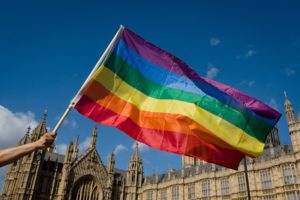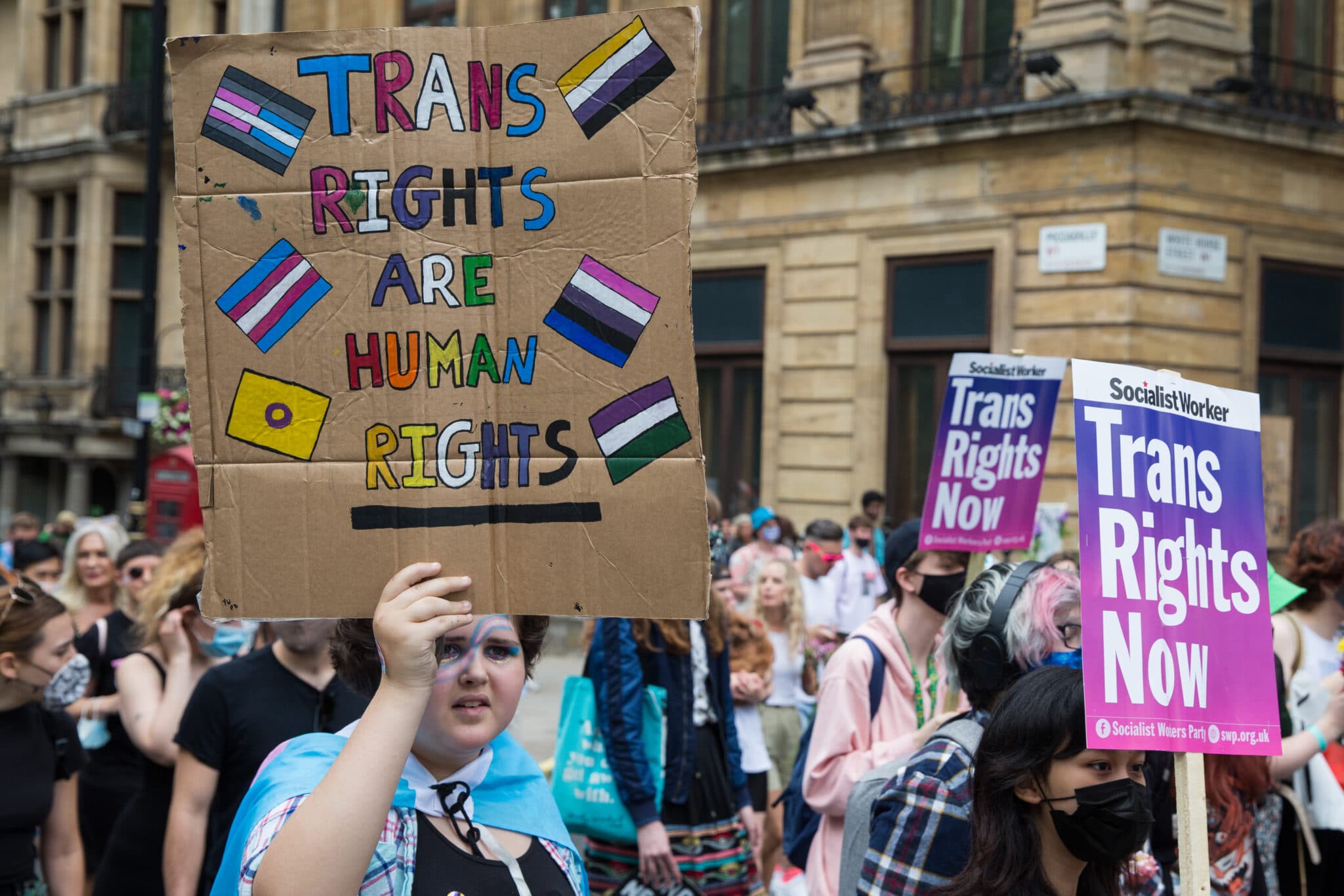Thousands of people take part in a London Trans+ Pride march from the Wellington Arch to Soho Square on 26th June 2021 in London, United Kingdom. London Trans+ Pride is a grassroots protest event which is not affiliated with Pride in London and focuses on creating a space for the London trans, non-binary, intersex and GNC community to come together to celebrate their identities and to fight for their rights. (photo by Mark Kerrison/In Pictures via Getty Images)
MPs are to debate introducing legal gender recognition for non-binary people after a petition amassed more than 140,000 signatures.
The Gender Recognition Act allows adult trans men and women to obtain legal recognition of their gender.
However, non-binary people have no path to legal recognition, meaning hundreds of thousands are living with inaccurate documentation, and are being misgendered on a daily basis.
On 23 May, parliament will debate a petition calling for a non-binary gender option to be included in the Gender Recognition Certificate process, “in order to allow those identifying as non binary to be legally seen as their true gender identity, as well as having ‘non-binary’ be seen as a valid transgender identity”.
“By recognising non-binary as a valid gender identity, it would aid in the protection of non-binary individuals against transphobic hate crimes, and would ease gender dysphoria experienced by non-binary people,” it continued.
Cleo Madeleine, communications officer at Gendered Intelligence, was among those to welcome the debate.
Madeleine told PinkNews: “Non-binary people currently have no path to legal recognition in the UK. This lack of recognition is not only discriminatory, it also causes harm by erasing an entire demographic comprising tens, if not hundreds of thousands of UK residents.
“That this is still considered a matter for debate is a testament to the UK’s backsliding on LGBTQ+ rights, with other nations around the world like Iceland and New Zealand pursuing and achieving legal recognition for their non-binary communities.
“Legal recognition would mean that non-binary people would no longer have to misgender themselves to travel internationally, open bank accounts, or obtain official documents. It would massively improve quality of life for an oft-overlooked marginalised group, and it would be a valuable commitment to progress on LGBTQ+ rights from a government that has been systematically failing us. More than anything, it would formally recognise the existence, in law, of the thousands of people who are made invisible by the UK’s outdated rules.”
The government responded to the petition almost a year ago, on 20 May, 2021, saying: “As set out in the response to the Gender Recognition Act consultation, there are no plans to make changes to the 2004 Act.”
It added: “The government noted that there were complex practical consequences for other areas of the law, service provision and public life if provision were to be made for non-binary gender recognition in the GRA.”
Back in 2018, Theresa May proposed sweeping reforms to the GRA.
A public consultation was launched into reform, with a majority of respondents backing the recognition of non-binary identities.
However, equalities minister Liz Truss disregarded this, electing not to meaningfully reform the GRA, and instead simply digitising the process and lowering the application fee to £5.
In December 2021, the cross-party Women and Equalities Select Committee urged the government to give non-binary people legal recognition by 2024.
It was asked to clarify the “barriers” preventing it from doing so.

According to the National LGBT Survey of 2017, which gathered 108,100 valid responses from LGBTQ+ people, the life satisfaction score of non-binary respondents was 5.5 out of ten, compared to the 7.7 of the general UK population.
And with the government failing to protect trans youth from conversion therapy, those figures are unlikely to change for the better anytime soon.
Back in March, Boris Johnson dropped plans to legislate against trans conversion therapy, instead confirming he would move ahead with a ban on LGB conversion therapy only.
Non-binary people make up around half of the UK’s trans population, itself around half a million people, according to the government’s own tentative estimates.
